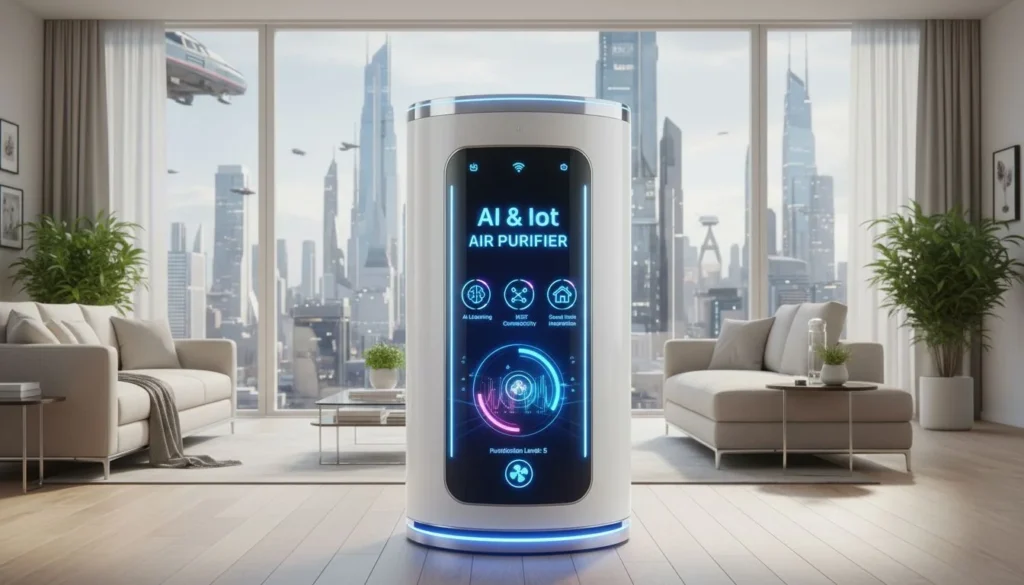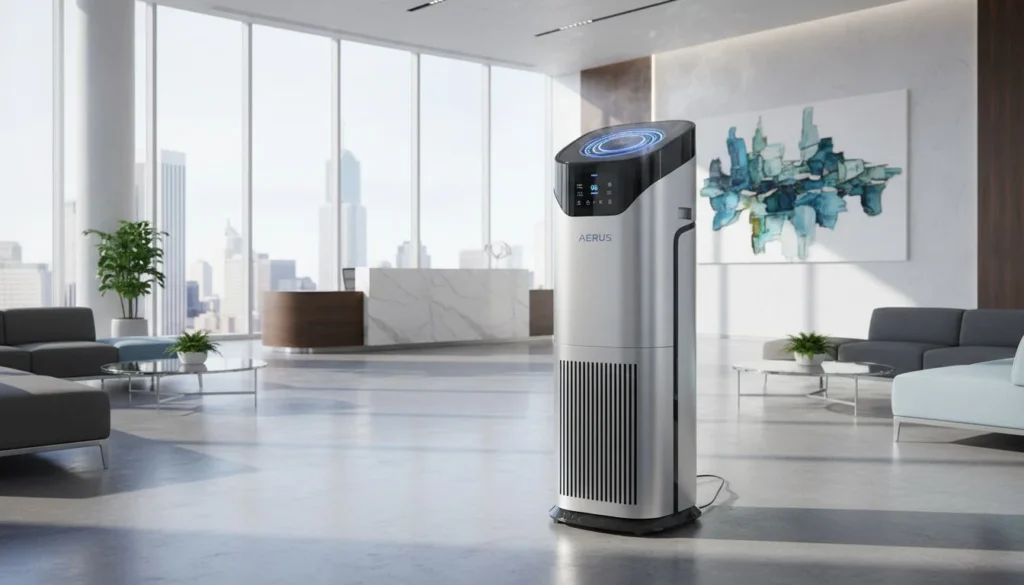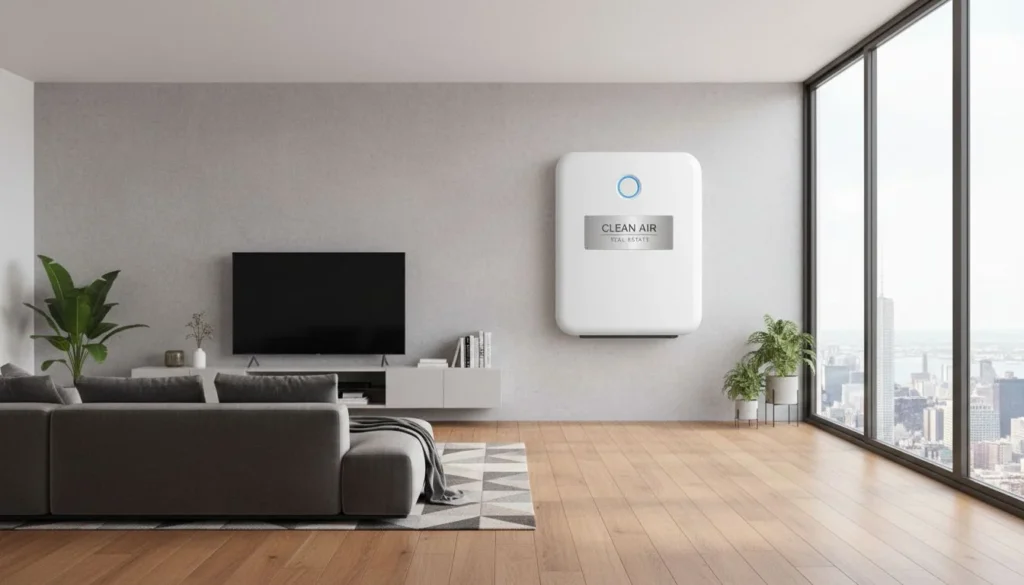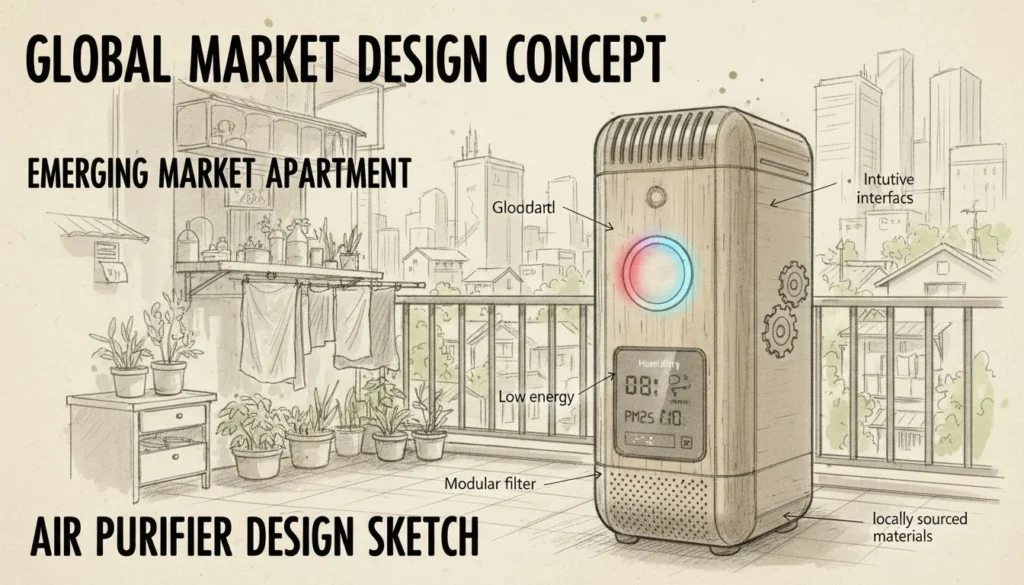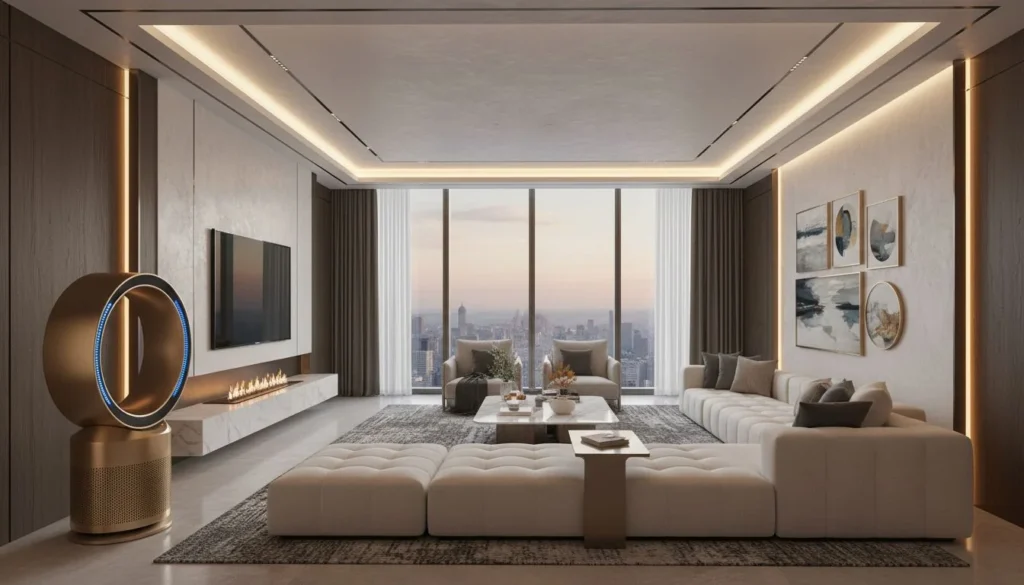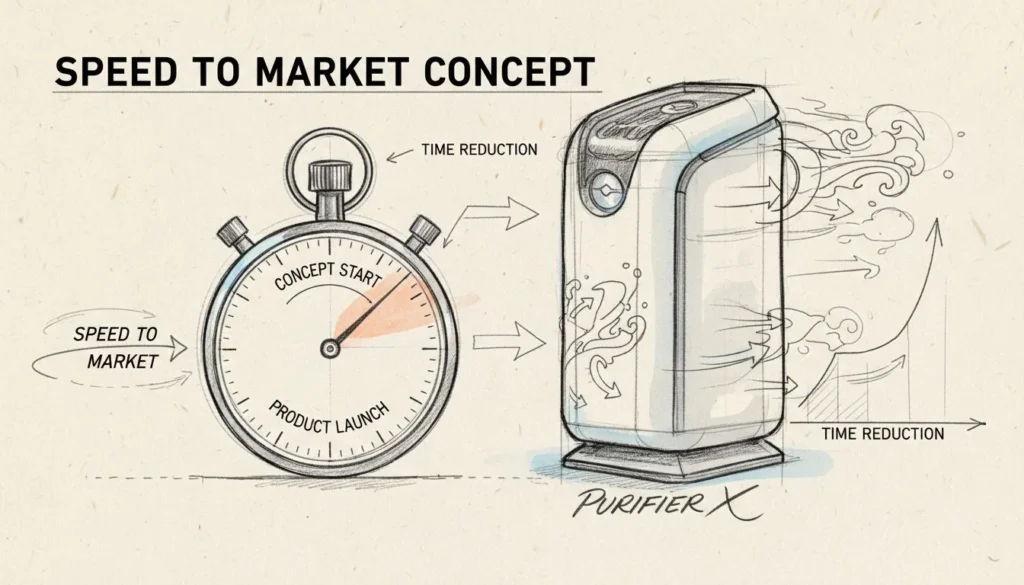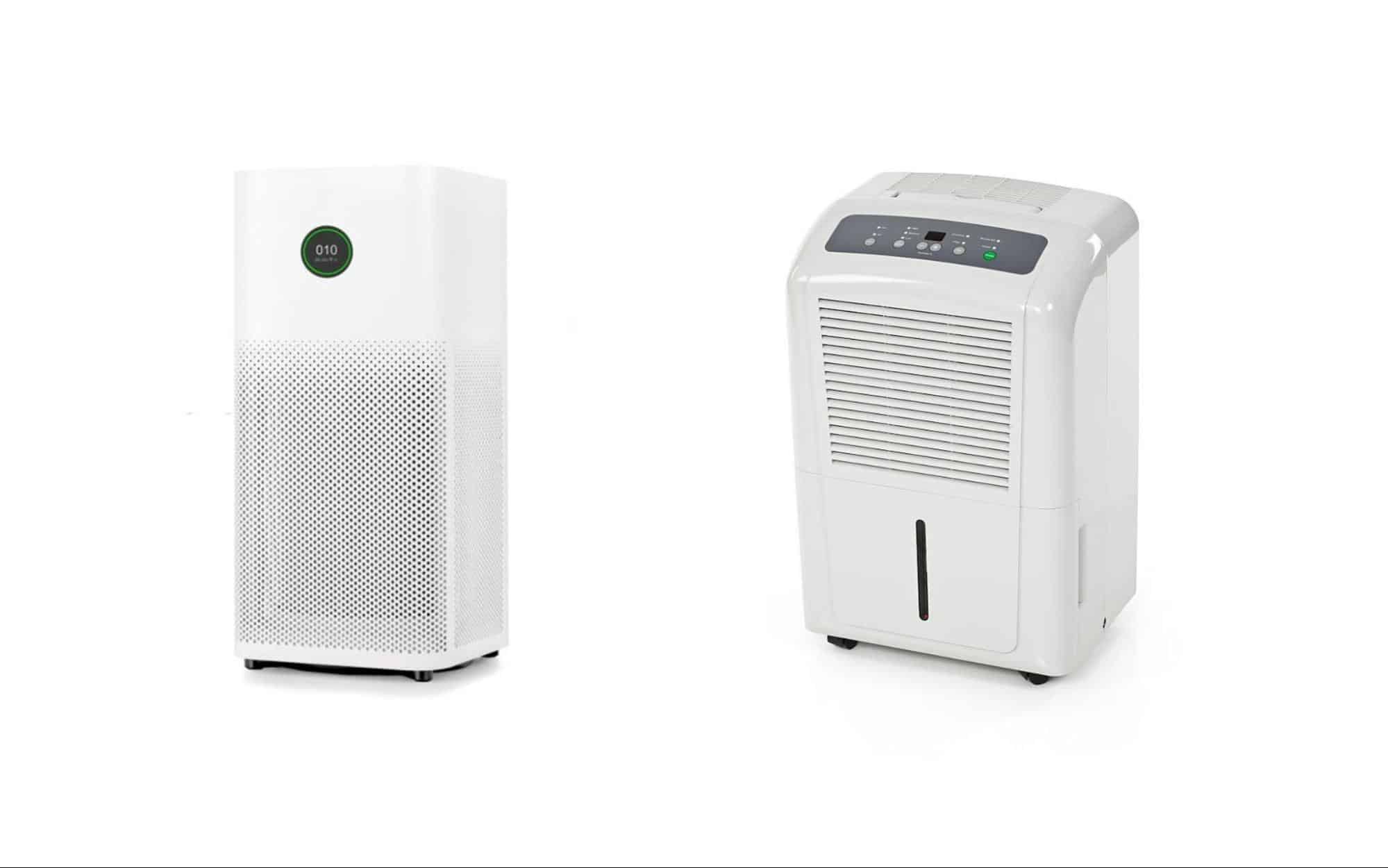
이미지 출처: iStockPhoto
공기청정기와 제습기는 현대 가정에서 인기 있는 두 가지 가전제품입니다. 공기청정기의 주요 목표는 실내 공기를 통기성 있고 신선하게 유지하는 것입니다. 제습기와 가습기는 실내 습도를 조절하는 데 사용되는 두 가지 장치입니다. 이러한 장치는 실내 습도를 조절하여 곰팡이 및 곰팡이의 번식을 방지하는 데 사용됩니다.
그러나 공기청정기는 제습기와는 다르므로 알아야 할 뉘앙스가 있습니다. 물론 이 둘의 뚜렷한 차이점은 고유한 기능입니다. 여기에서 자세히 알아보세요.
What Is an Air Purifier vs. Dehumidifier
공기 청정기란 무엇인가요?
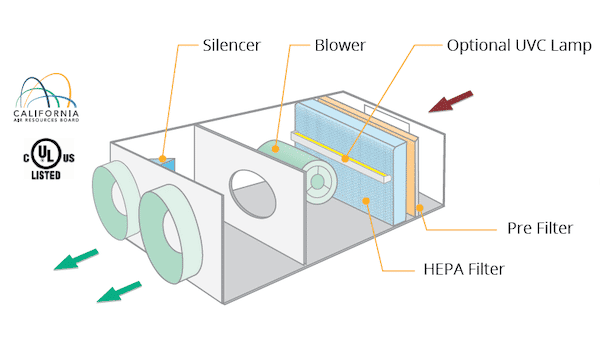
이미지 출처: 캘리포니아 대기 자원 위원회
앞서 언급했듯이 공기청정기는 실내의 공기 중 오염 물질을 포집하도록 설계되었습니다. 이러한 장치는 일반적으로 가정과 기업에서 공기질을 개선하기 위해 사용됩니다.
공기청정기는 실내 공기를 빨아들여 여러 층의 필터를 통과시키는 방식으로 작동합니다. 이러한 필터는 통과하는 공기에서 먼지, 꽃가루, 연기 등의 이물질을 제거합니다. 이러한 공기청정기는 특수 필터(예: HEPA 필터)를 사용하여 숨 쉬는 공기 중의 박테리아, 바이러스, 화학물질 및 냄새를 제거할 수 있습니다.
제습기란 무엇인가요?
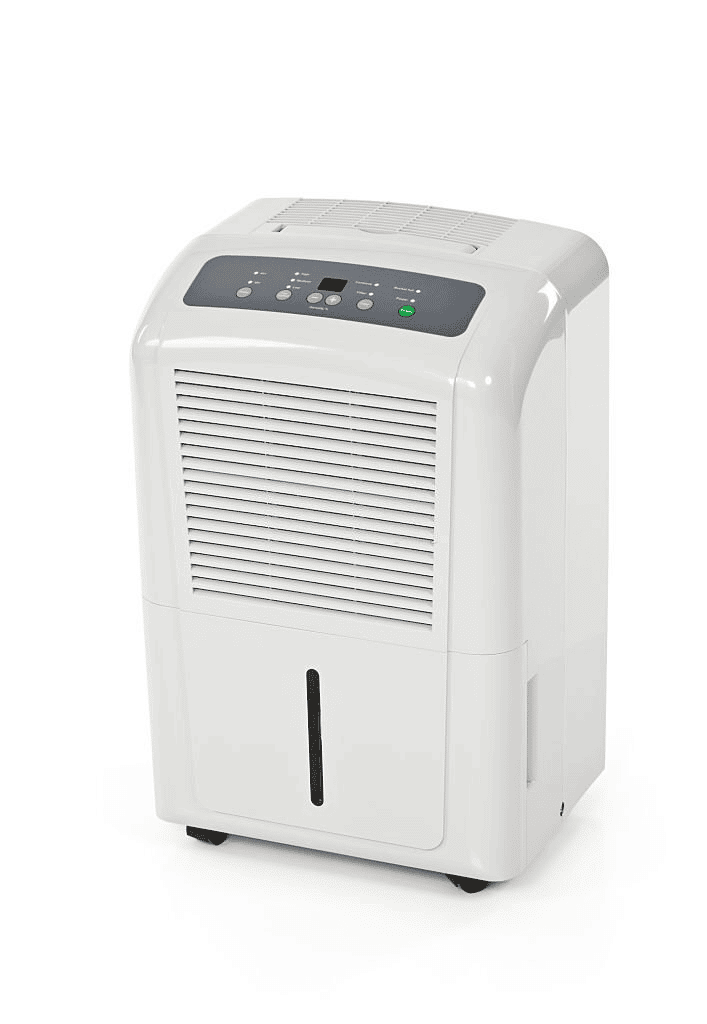
제습기는 공기 중의 습기를 제거하는 데 사용되는 전기 제품입니다. 이 기기는 가정과 기업에서 곰팡이 및 곰팡이 번식을 방지하고 퀴퀴한 냄새를 제거하기 위해 자주 사용됩니다.
제습기는 실내 공기를 흡수하여 차가운 코일을 통과시키는 방식으로 작동합니다. 이 특별한 메커니즘을 통해 공기 중의 수분이 응축됩니다. 일단 응결이 일어나면 물은 공기에서 분리됩니다. 그런 다음 남은 물은 용기나 양동이에 모입니다.
제습기에도 필터가 있나요? 상황에 따라 다릅니다. 필터가 있는 제품도 있고 없는 제품도 있습니다.
공기청정기 대 제습기 기능 개요
| 비교 | 공기 청정기 | 제습기 |
|---|---|---|
| 습도 | 다를 수 있습니다. | 실내 상대 습도가 50%보다 높을 때 사용 |
| 적용 가능한 객실 크기 범위 | 모델 용량에 따라 다름 | 모델 용량에 따라 다름 |
| 소음 수준 | 20 - 50 데시벨 | 25 - 40 데시벨 |
| 유형 | 필터 기반, 자외선 조명, 흡착제, 오존 발생기 | 기계식, 에어컨, 건조제, 전자식, 이온식 |
| 기능 | 필터는 공기 중 오염 물질을 포집하고 제거하는 데 사용됩니다. | 대기 중 수분을 증가시켜 건조한 환경으로 인한 불편함을 줄여줍니다. |
공기청정기와 제습기의 장점 비교
위의 설명을 바탕으로 공기청정기와 제습기의 모든 가능한 이점을 아래 표에 나열했습니다. 아래에서 확인하세요:
| 공기 청정기 | 제습기 |
|---|---|
| 천식 및 유사 증상 완화 잠재적으로 위험한 공기 중 화학 물질 및 독소 제거 공기 중의 악취 중화 공기 매개 질병 발생 완화 수면 패턴 개선 라돈 및 석면 제거 |
결로 현상 완화 곰팡이 및 곰팡이 성장 감소 침수 및 누수 청소 최소화 공기 중 퀴퀴한 냄새 제거 다양한 알레르기 증상 완화 해충 및 감염의 성장 방지 집먼지 진드기 증식 방지 호흡 개선 집의 구조적 무결성을 보호합니다. |
공기 제습기의 장점
요약하자면, 제습기는 많은 가정, 특히 습기가 많은 공간에서 필수적인 가전제품입니다. 다시 말하지만, 제습기는 공기 중 높은 수준의 습기를 완화합니다. 결과적으로 이러한 가전제품은 곰팡이와 곰팡이의 증식을 방지합니다.
동시에 제습기는 집이 손상되지 않도록 보호하는 데도 도움이 됩니다. 제습기는 또한 공기질을 개선하여 편리하게 숨을 쉴 수 있게 해줍니다.
공기청정기의 장점
공기청정기는 먼지, 꽃가루, 곰팡이 포자, 애완동물 비듬 등 공기 중 유해한 입자를 제거할 수 있습니다. 또한 탄소 필터가 있는 공기청정기는 공기에서 불쾌한 냄새를 제거할 수 있습니다. 집이나 사무실에 두고 사용할 수 있습니다. 신선하고 깨끗한 냄새. 흥미롭게도 공기청정기는 숙면에 도움이 될 수 있는 백색 소음을 발생시킵니다.
또 다른 주요 이점 공기 청정기 기부는 건강을 개선하는 것입니다. 공기 중 유해한 입자를 제거하면 호흡기 질환 발병 위험을 줄이고 수명을 늘릴 수 있습니다.
Difference Between Air Purifier and Dehumidifier
공기청정기의 가장 큰 차이점은 고유의 기능입니다. 다음은 주요 차이점입니다:
기능
- 공기 청정기는 공기 중 오염 물질을 제거합니다.
- 제습기는 공기 중의 과도한 수분을 제거합니다.
디자인
- 공기청정기는 필터를 사용하여 실내 공기 오염 물질을 제거합니다.
- 제습기는 코일 또는 습기 제거 매체를 사용합니다.
사용 위치
- 공기청정기는 모든 실내 공간에서 독점적으로 사용됩니다.
- 제습기는 실내에서만 사용합니다.
사용 시기
- 공기청정기는 실내 공기가 오염된 공간에 적합합니다.
- 제습기는 일반적으로 습도가 높은 방에 사용됩니다.
제습기의 종류
히트 펌프 제습기
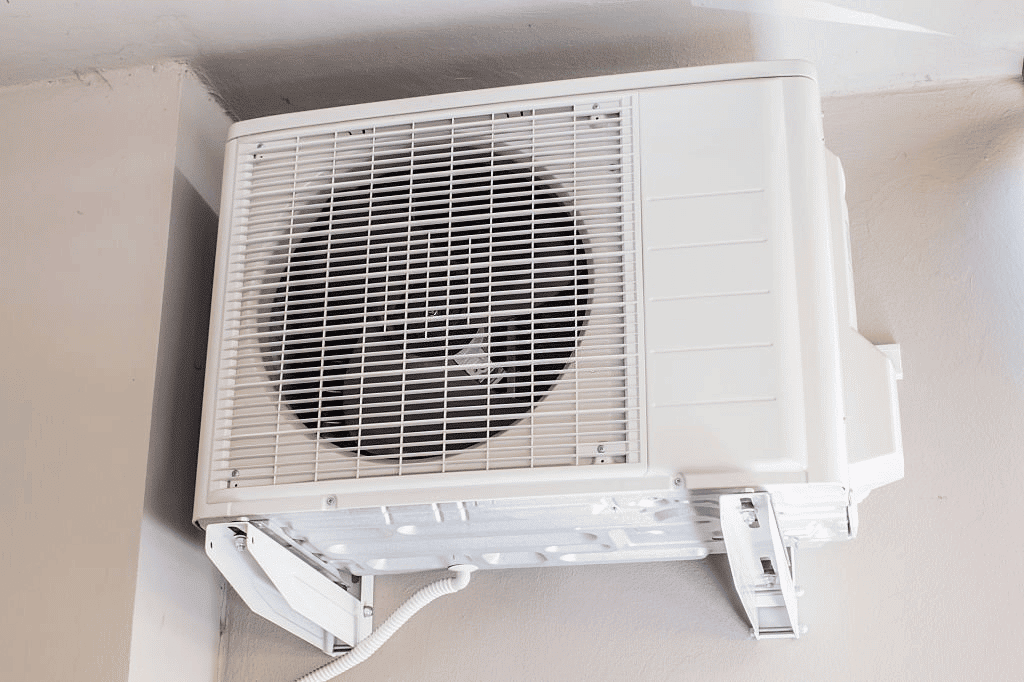
이미지 출처: iStockPhoto
이러한 제습기는 히트 펌프, 코일 및 팬을 사용하여 과도한 공기 습기를 제거합니다. 팬은 공기를 코일로 보내 응축을 일으킵니다. 그런 다음 잔여 물은 장치의 탱크에 모입니다.
제습 환풍기
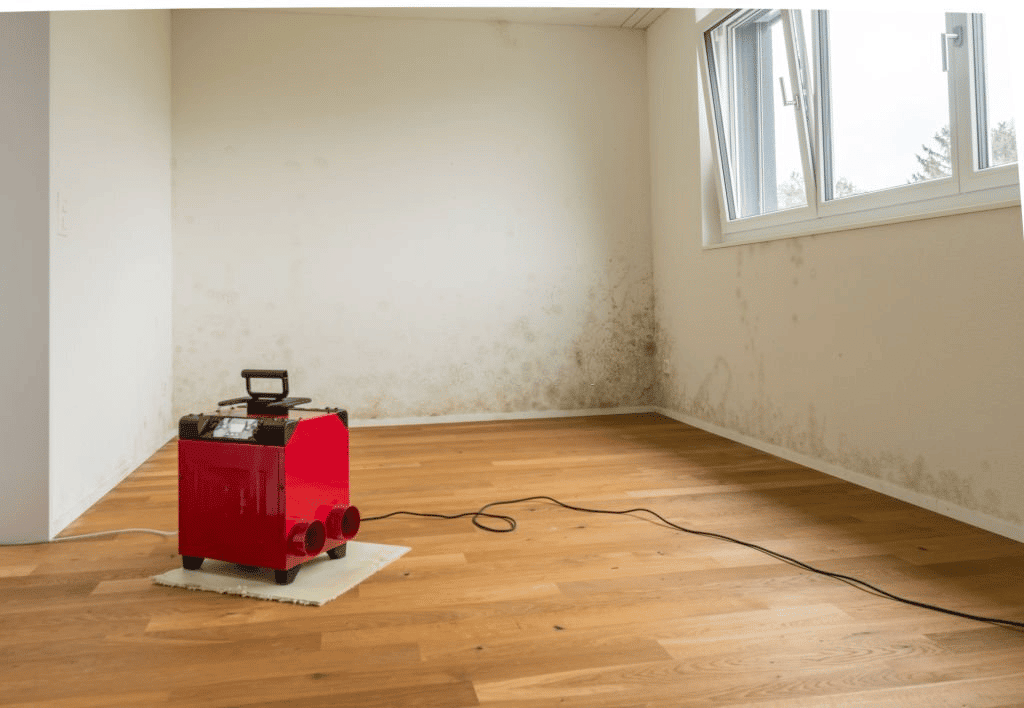
이미지 출처: iStockPhoto
이 환풍기에는 실내 공기를 외부로 배출하는 배기 팬이 장착되어 있습니다. 일반적으로 크롤링 공간, 다락방 및 지하실에서 사용됩니다.
건조제
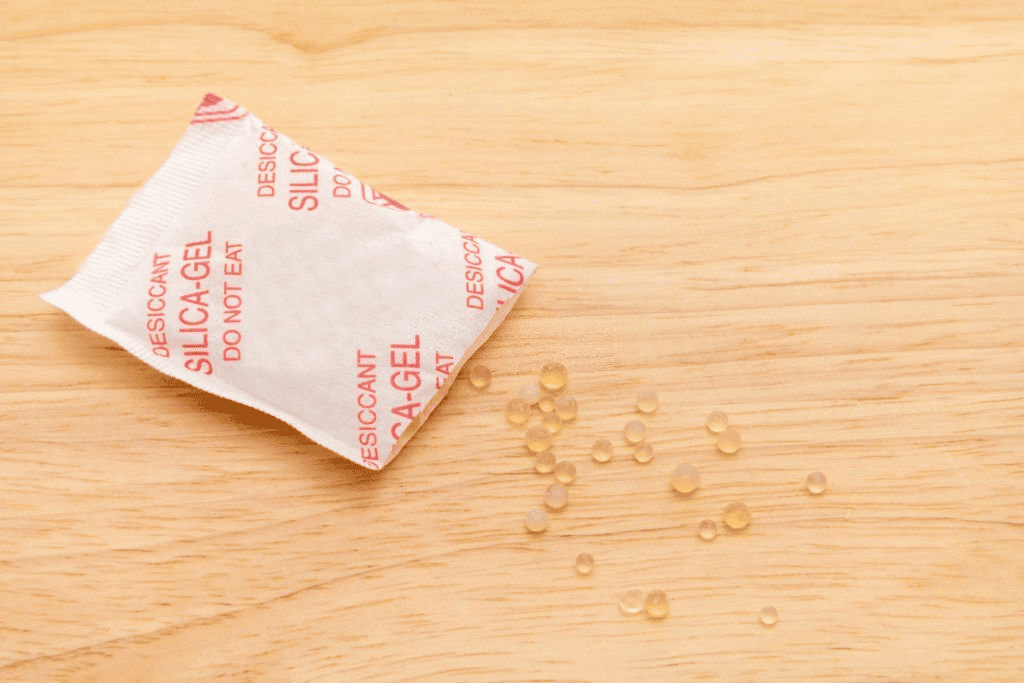
화학 흡수성 제습제라고도 하는 제습제는 공기 중의 수분을 포집하는 친수성 물질을 함유하고 있습니다.
공기청정기의 종류
공기 청정기 필터
이름에서 알 수 있듯이 공기청정기는 여러 필터를 사용해 오염 물질을 포집합니다. 일반적으로 사용되는 필터에는 HEPA 필터, 활성탄 필터, 기계식 필터가 있습니다. 필터 공기청정기는 공기 중 오염 물질을 제거하는 데 가장 효과적인 것으로 알려져 있습니다. 벽걸이형 공기청정기 필터도 사용할 수 있습니다.
자외선 공기 청정기
자외선 공기청정기는 자외선을 사용하여 바이러스, 박테리아 및 기타 병원균을 서서히 제거합니다.
오존 발생기
Ozone generators release ozone in the air to "clump" airborne particles and let them "fall" on the ground. Accordingly, they can make contaminants heavier, losing their ability to float in the air. However, ozone generators aren't safe, according to the EPA.
공기청정기 대 제습기: 사용 시기
공기청정기를 사용하는 경우
다음은 사용 시기를 결정하는 데 도움이 되는 몇 가지 지침입니다. 공기 청정기 실내 공간에서 사용할 수 있습니다.
- 대기 오염이 심한 지역에 거주하는 경우 공기청정기를 사용하면 유해 독소에 대한 노출을 줄이는 데 도움이 될 수 있습니다.
- 가족 중 천식이나 기타 호흡기 질환이 있는 경우
- 집안에 흡연자가 있는 경우 공기청정기는 매우 유용합니다.
제습기를 사용하는 경우:
제습기를 사용하는 것이 정당한 상황입니다:
- 습도가 높은 지역에 거주하는 경우
- 가정에서 물 사용량이 많은 경우
- 곰팡이 및 곰팡이 성장의 명백한 징후가 있는 경우
- 집안의 가구, 벽, 목재 구조물이 습기로 인해 썩는 경우
제습기는 무엇에 좋은가요, 제습기는 얼마나 좋은가요?
제습기는 공기 중의 과도한 습기를 제거하여 집을 쾌적하게 유지하는 데 중요한 도구입니다. 제습기는 생활 공간의 상대 습도를 조절하는 데 필수적입니다.
제습기는 건강에 나쁜가요?
아니요. 제습기가 건강에 해롭다는 과학적 연구 결과는 없습니다. 결국 제습기에는 유해한 배출물이 없습니다.
제습기가 공기를 정화하나요?
제습기가 공기를 정화하나요? 일부 제습기에는 필터가 장착되어 있습니다. 따라서 기술적으로 이러한 제습기는 실내 공기를 정화하는 데 도움이 될 수 있습니다. 하지만 제습기의 공기 정화 효과는 공기청정기만큼 뛰어나지 않습니다. 따라서 제습기를 공기 정화 목적으로만 사용하는 것은 권장하지 않습니다.
제습기는 효과적일까요?
예. 제습기는 일반적으로 공기 중의 습기를 제거하는 데 효과적입니다. 그러나 일부 제습기는 다른 제습기보다 확실히 더 나은 제습기가 있습니다. 따라서 자신에게 가장 적합한 제습기를 신중하게 선택해야 합니다.
공기청정기는 무엇에 좋은가요, 공기청정기는 얼마나 좋은가요?
공기청정기는 제습 기능을 하나요?
아니요, 그렇지 않습니다. 공기 청정기 기능 호흡기 건강을 해칠 수 있는 공기 미립자를 포집합니다. 공기에서 수분을 포집할 수 있는 특별한 설계가 있는 것은 아닙니다. 일반적인 생각과는 달리, 이러한 공기청정기의 필터는 수증기를 제거하지 않습니다.
공기청정기가 공기를 건조하게 하나요?
공기청정기는 결로 현상을 일으키지 않기 때문에 공기 중 수분을 흡수할 수 없습니다. 앞서 언급했듯이 공기청정기의 필터는 수분을 포집하도록 설계되지 않았습니다. 공기청정기를 장시간 가동하더라도 공기를 건조시키지 않습니다.
공기청정기와 제습기를 같은 방에서 사용할 수 있나요?
예. 공기청정기와 제습기를 한 방에 둘 수 있습니다. 한 기기가 작동하지 못하게 하는 상쇄 작용이나 무효화 작용을 일으키지 않습니다. 실제로 많은 전문가들은 특히 집안에 습도가 높고 실내 공기 오염 문제가 있는 경우 이러한 장치를 동시에 사용할 것을 권장합니다.
공기청정기를 어디에 두어야 하나요?
이렇게 하면 안내 공기청정기는 공기 질이 문제가 되는 공간에 배치하는 것이 가장 좋습니다. 특히 공기 흐름에 방해가 되지 않는 위치에 배치해야 합니다. 생활 공간의 중앙이나 가구로 둘러싸여 있지 않은 곳에 배치할 수 있습니다. 공기청정기를 높은 곳에 두어 천장에서 순환하는 공기를 흡수할 수 있도록 할 수도 있습니다.
제습기를 어디에 두어야 하나요?
제습기는 습도가 높은 공간에 설치하는 것이 가장 좋습니다. 즉, 지하실, 지하실, 다락방 등 공기 순환이 잘 되지 않는 공간에 두는 것이 좋습니다. 물 사용량이 많은 욕실과 주방 근처에도 제습기를 놓을 수 있습니다. 가이드라인으로 제습기 주변에 장애물이 없는지 확인하세요.
지하실용 공기청정기와 제습기: 어느 것이 더 낫나요?
이 질문에 대한 정확한 답은 없습니다. 여기서 가장 중요한 것은 사용자의 요구 사항이기 때문입니다. 지하실에 곰팡이가 피거나 냄새가 나나요? 먼지나 기타 공기 중 입자로 오염되어 있나요? 이러한 질문에 대한 답변에 따라 어떤 장치를 사용해야 할지 결정할 수 있습니다. 하지만 공기청정기와 제습기를 동시에 사용하는 것은 언제나 자유입니다.
두 대의 가전제품을 동시에 사용하는 것이 부담스럽다면 HEPA 필터가 장착된 지하실 제습기를 사용할 수 있습니다.
건강을 위해 공기청정기나 제습기가 필요한가요?
공기청정기와 제습기 모두 건강을 개선할 수 있습니다. 하지만 어느 한 쪽이 다른 쪽보다 더 좋은 경우도 있습니다.
기침용 공기청정기 대 제습기
공기청정기가 기침에 도움이 되나요?
특히 기침이 공기 중 오염 물질 흡입으로 인해 발생하는 경우라면 더욱 그렇습니다. 공기청정기는 공기에서 알레르겐과 기타 자극 물질을 제거하여 기침 반사를 유발하는 요인을 완화합니다.
제습기가 기침에 도움이 되나요?
제습기가 기침을 직접적으로 치료하지는 않지만, 습기를 제거하여 실내 공기질을 개선하는 데 도움이 될 수 있습니다. 제습기는 공기 중의 수분을 제거하는 방식으로 작동합니다. 공기 중 수분이 적다는 것은 집먼지 진드기, 곰팡이, 곰팡이가 서식하기 좋은 환경이 아니라는 뜻입니다. 이들은 모두 기침을 유발하는 흔한 원인입니다.
코 막힘을 위한 공기청정기 대 제습기
공기청정기가 코 막힘에 도움이 되나요?
공기청정기는 먼지, 꽃가루, 애완동물의 비듬 등 공기 중의 입자를 가두는 방식으로 작동합니다. 이는 코 막힘과 같은 알레르기 및 기타 호흡기 질환의 증상을 완화하는 데 도움이 될 수 있습니다.
제습기가 코막힘에 도움이 되나요?
날씨가 춥고 건조할 때마다 집 안 공기도 뜨거워지고 건조해질 수 있습니다. 이는 코와 목에 자극을 유발하고 코막힘을 유발할 수 있습니다. 제습기는 공기 중의 과도한 수증기를 제거하여 코 막힘을 완화하는 데 도움이 될 수 있습니다.
공기청정기와 제습기: 박테리아 완화에 어떤 것이 더 좋을까요?
박테리아 감염은 오늘날 많은 가정에서 흔히 발생하는 문제입니다. 흥미롭게도 공기청정기와 제습기는 다양한 병원균에 대처하는 데 도움이 될 수 있습니다.
알레르기를 위한 공기청정기 대 제습기
공기청정기가 알레르기에 도움이 되나요?
공기청정기는 공기 중에 떠다니는 박테리아를 제거하여 숨쉬기 편한 환경을 만들어 줍니다. 하지만 먼저 HEPA 필터가 장착된 공기청정기를 선택해야 합니다. HEPA 필터는 박테리아와 같은 작은 입자를 걸러내도록 설계되어 알레르기에 이상적입니다.
제습기가 알레르기에 도움이 되나요?
제습기는 박테리아를 직접 죽이지는 못하지만 공기 중의 습기를 줄이는 데 도움이 될 수 있습니다. 습도가 낮은 환경은 박테리아가 살기 좋은 환경이 아닙니다. 따라서 제습기는 병원균의 증식을 방지할 수 있습니다. 알레르기를 위한 가습기 또는 제습기? 습기 관련 알레르기가 있는 경우 제습기 사용을 권장합니다.
집먼지 진드기를 위한 공기청정기 대 제습기
공기청정기가 집먼지 진드기에 도움이 되나요?
공기청정기의 장점은 다음과 같은 분야에서 탁월하다는 것입니다. 먼지 제거 및 집먼지 진드기. 집먼지 진드기는 공기청정기가 흡수하고 포집할 수 있을 정도로 가볍습니다.
제습기가 집먼지 진드기에 도움이 되나요?
제습기는 집먼지 진드기가 살기 좋은 실내 환경을 만들어 집먼지 진드기의 존재를 줄일 수 있습니다. 공기가 시원하고 건조하면 집먼지 진드기가 증식할 수 없습니다.
곰팡이용 공기청정기 대 제습기
공기청정기가 곰팡이에 도움이 되나요?
예. 공기청정기는 HEPA 필터와 같은 고급 필터 매체 덕분에 공기 중의 작은 입자를 포집할 수 있습니다. 이러한 필터는 작은 입자를 가두어 실내 공기에서 순환하는 것을 방지할 수 있습니다.
제습기가 곰팡이에 도움이 되나요?
집먼지 진드기와 마찬가지로 제습기도 실내 공기를 곰팡이 포자가 서식하기 좋은 환경으로 만들 수 있습니다. 하지만 제습기가 곰팡이를 죽일 수 있나요? 아니요, 그럴 수 없습니다. 제습기는 이러한 병원균이 서식하기 어려운 실내 환경을 만들 수 있을 뿐입니다.
천식을 위한 공기청정기 대 제습기
공기청정기가 천식에 도움이 되나요?
공기청정기로 천식을 완치할 수는 없지만, 공기 중 일부 유발 물질을 제거하여 증상의 심각성을 완화하는 데 도움이 될 수 있습니다. 천식은 먼지, 곰팡이 포자, 특정 냄새와 같은 특정 알레르겐으로 인해 발생합니다.
제습기가 천식에 도움이 되나요?
제습기가 천식에 도움이 되나요? 네. 습도가 높으면 곰팡이가 생깁니다. 곰팡이는 천식 및 기타 호흡기 문제를 일으킬 수 있습니다. 따라서 제습기를 사용하면 실제로 천식 발작을 줄일 수 있습니다. 천식 때문에 가습기와 제습기 사이에서 고민 중이신가요? 천식이 과도한 실내 습기로 인해 발생한다면 제습기를 선택하세요.
공기청정기와 제습기: 어느 쪽이 더 낫나
공기청정기와 제습기는 각각의 기능과 강점이 있습니다. 하지만 이 두 가지 가전 제품 중 하나에만 투자할 수 있다면 다음과 같이 추천합니다. 공기청정기 구매하기. 공기청정기는 수많은 실내 공기 오염 물질을 제거할 수 있습니다. 곰팡이, 먼지, 병원균의 수치를 억제할 수 있습니다. 반대로 제습기는 할 수 있는 일이 제한적입니다.
공기청정기 구매 시기
천식 및 알레르기 발작이 증가하면 공기청정기가 필요합니다. 동시에 실내 공기의 질을 유지하려면 이러한 장치가 필요합니다.
공기청정기를 선택할 때 다음 브랜드를 고려할 수 있습니다:
- HisoAir - 히소에어 공기청정기는 모두 의료용으로, 상업용 및 주거용으로 유용하게 사용할 수 있습니다.
- 하니웰 - 하니웰은 최고의 공기청정기 브랜드입니다. 주거용 공기청정기의 광범위한 카탈로그를 보유하고 있습니다.
- Ider - Ider는 잘 알려지지 않은 공기청정기 브랜드입니다. 하지만 이더의 공기청정기는 실제로 사용해 볼 만한 가치가 있습니다.
HisoAir는 프리미어 브랜드 고효율 공기청정기를 공급하고 있습니다. 국내 및 해외 고객의 대량 주문에 대응합니다. 또한 OEM/ODM 서비스도 제공합니다. 히소에어 공기청정기에 관심이 있으시면 연락주세요. 연중무휴 24시간 문의를 받고 있습니다.


